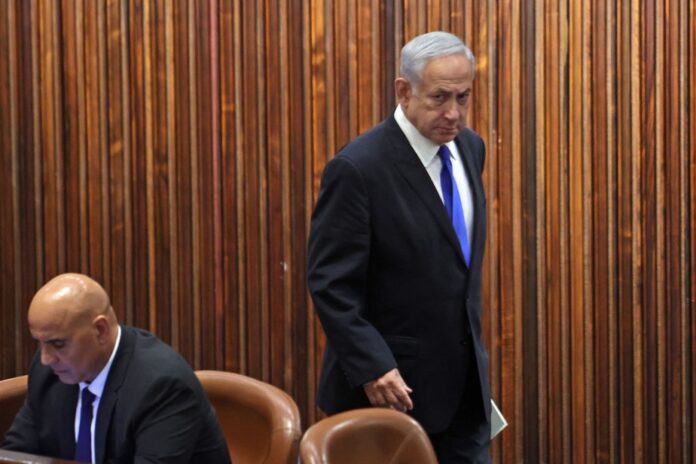(Jerusalem) Israeli Prime Minister Binyamin Netanyahu sacked his defense minister on Sunday, who the day before called for a month-long pause in the government’s controversial judicial reform process.
The reform which aims to increase the power of elected officials over that of magistrates jeopardizes, according to its detractors, the democratic character of the State of Israel.
Mr. Netanyahu and his far-right and ultra-Orthodox allies consider it necessary to restore a balanced balance of power between elected officials and the Supreme Court, which they consider politicized.
“Prime Minister Binyamin Netanyahu has decided to remove Defense Minister Yoav Galant from office,” his office said in a brief statement.
In a speech on Saturday evening, Mr. Galant, although from the same right-wing party as Mr. Netanyahu, the Likud, said he feared that a continuation of divisions within the population on this issue would create a “real threat to the security of ‘Israel’.
“The security of Israel has always been and always will be my life’s mission,” he tweeted Sunday in response to his dismissal.
The day before, he called for “the legislative process to be halted” for a month, ahead of a crucial week that is expected to see more legislation and further mass protests.
“I am committed to the values of Likud […] but major changes at the national level must be done through consultation and dialogue,” the minister added.
Mr. Galant meanwhile called for an end to the protests, as some 200,000 gathered against the reform in Tel Aviv, according to Israeli media estimates.
Demonstrations have followed one another each week since the presentation in January by the government of Binyamin Netanyahu, one of the most right-wing in the history of Israel, of the reform project which divides the country.
“Netanyahu can fire Gallant, but he can’t fire reality and he can’t fire the people of Israel who oppose the madness of the coalition,” opposition leader Yair tweeted. Lapid.
“Israel’s prime minister is a threat to Israel’s security,” he wrote.
On Saturday evening, he praised Mr. Gallant’s remarks, calling them “a brave step … for the security of Israel.”
Two Likud lawmakers also tweeted their support for Mr. Galant on Saturday, raising questions about whether the government could count on a majority if it takes a vote.
Israel’s main allies, including Washington, have questioned plans to give more power to politicians and reduce the role of the Supreme Court.
US President Joe Biden has expressed “concerns” about these judicial reforms, White House spokeswoman Karine Jean-Pierre said on Wednesday.
On Friday in London, where he received Mr. Netanyahu, British Prime Minister Rishi Sunak stressed “the importance of respecting the democratic values that underpin the relationship [between the two countries], including in the judicial reform project in Israel “, according to a spokesperson in Downing Street.
Israeli MPs are expected to vote in the coming days on one of the central elements of the reform, at the heart of the concerns of its detractors, foreseeing the change in the process for appointing judges.
In a speech broadcast on television Thursday evening, Mr. Netanyahu, who had so far remained in the background on this issue, pledged to “end the division among the people”, while underlining his determination to do advance the reform.
The next day, he was called to order by the courts, which deemed his public intervention “illegal” given his ongoing corruption trials.
And on Sunday the Supreme Court gave the prime minister a week to respond to an NGO petition asking that he be punished for “contempt of court” after that speech.
According to the Movement for Quality Government in Israel petition, seen by AFP, Netanyahu, indicted in a series of corruption cases, breached a court agreement that an indicted prime minister did not not allowed to act in an area that could place him in a conflict of interest, according to a 2020 Supreme Court ruling.


















